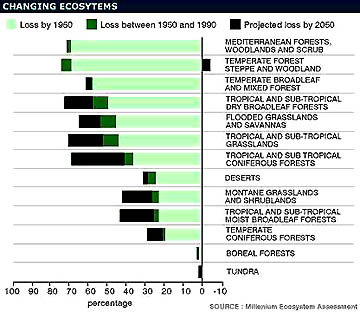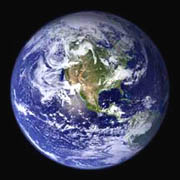“This (U. N.) report is essentially an audit of nature’s economy, and the audit shows we’ve driven most of the accounts into the red.”
– Jonathan Lash, World Resources Institute
March 31, 2005 Washington, D. C. – This week, the United Nation’s Millennium Ecosystem Assessment program held press conferences in London, Washington, D.C., Tokyo, Beijing, New Delhi, Brasilia, Cairo, Nairobi and Rome to announce results from an unprecedented study of the Earth’s ecosystem by more than 1300 scientists from 95 countries that began in 2001. The current data is sobering. Fifteen of the twenty-four services the assessment analyzed have degraded – most notably fresh air and water, fisheries, water purification, forests, other habitats and the regulation of climate, natural hazards and pests.
That means 60% of the Earth’s ecosystem is facing serious degradation or destruction by 2050 because “humans have changed ecosystems more rapidly and extensively in the past 50 years than in any other period. The result is a substantial and largely irreversible loss in diversity of life on Earth, with some ten to thirty percent of the mammal, bird and amphibian species currently threatened with extinction.”

Harold A. Mooney, Professor of Environmental Biology at Stanford University and Co-chair of the Assessment’s Science Oversight Panel, told the press that the assessment, “examines the state of the global environment, but it’s more than that. It relates goods and services that ecosystems provide to human well-being. And surprisingly enough, that’s never been done before.”
Prof. Mooney explained further, “By evaluating the trade-offs that accompany decisions about ecosystem services, the assessment will identify priorities on local, regional and global scales. In a particular area, for example, it can help policy makers decide whether the benefits of increasing food production will outweigh the effects on water quality and biodiversity by giving them the information they need to make tough decisions. This is really important because the global view gives averages, and global averages may be misleading,” Mooney said, explaining that different ecosystems face different issues such as overfishing in the Caribbean, groundwater usage in Chile’s Atacama Desert or wood fuel harvesting in Zambia. The world’s poorest people stand to lose the most from environmental change, because they depend heavily on the natural ecosystem. One example is Sub-Saharan Africa which has severe poverty because climate change has made farming difficult.
According to Mooney, the assessment’s topics were chosen “because the organizations that oversee major international treaties dealing with biological systems requested the information. The lack of adequate data to uphold such treaties is what helped convince the United Nations to have the assessment done.”
The huge ecosystem study will be released in sections over the next few months:
May = Global Biodiversity
June = Desertification
July = Wetlands, Impacts on Human Health and Role of Private Sector
Sept = Five technical reports about ties between ecosystems and human well-being

Websites:
http://www.millenniumassessment.org/en/index.aspx
© 1998 - 2024 by Linda Moulton Howe.
All Rights Reserved.

